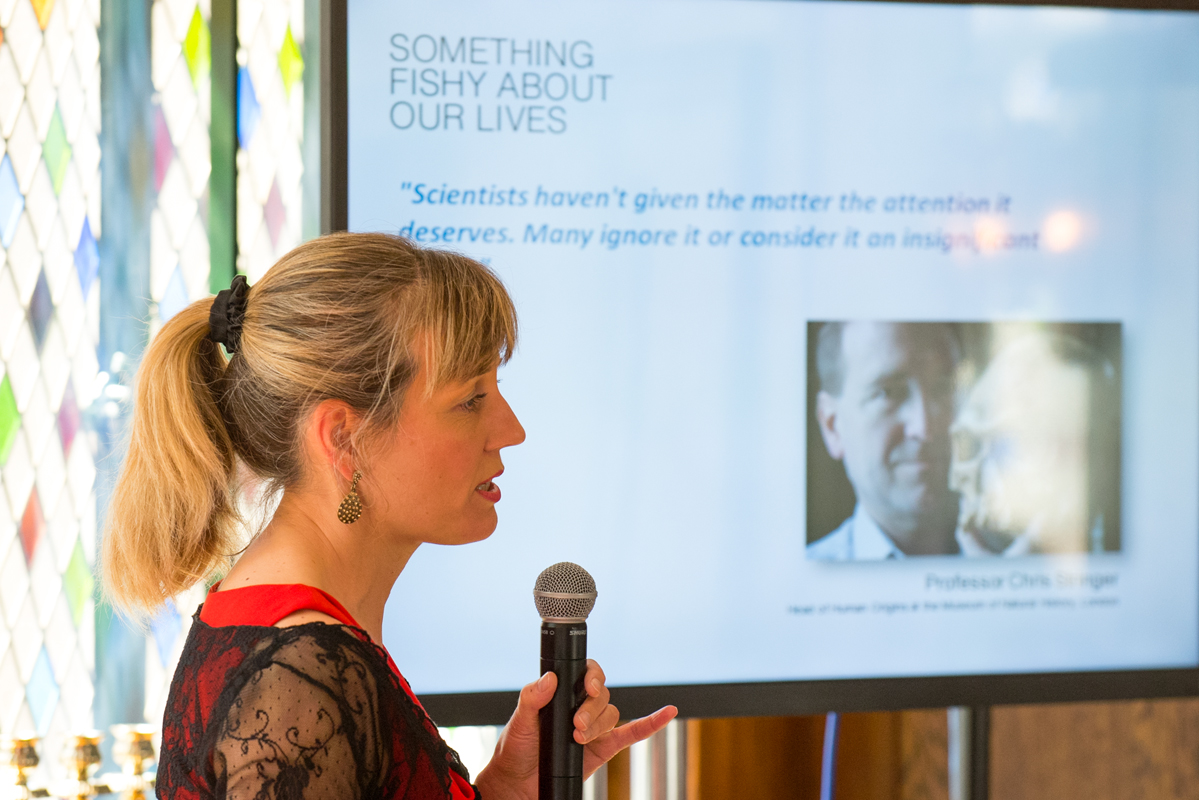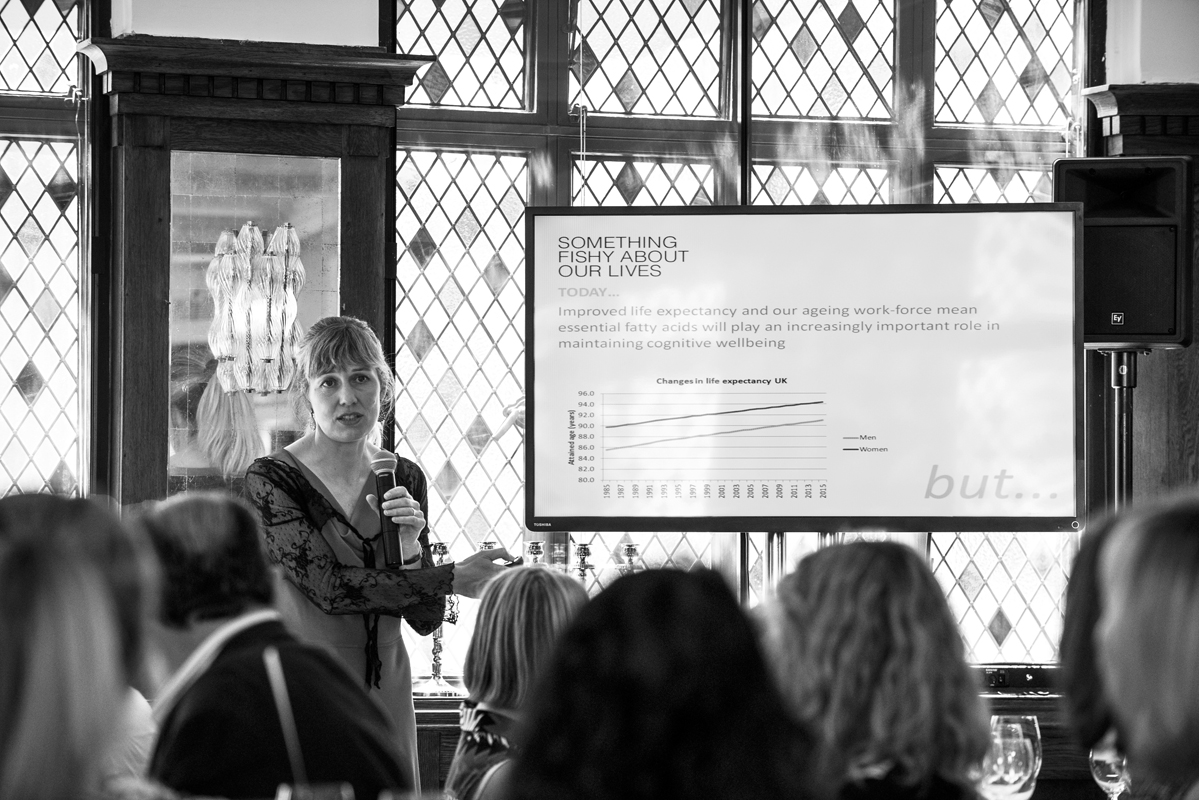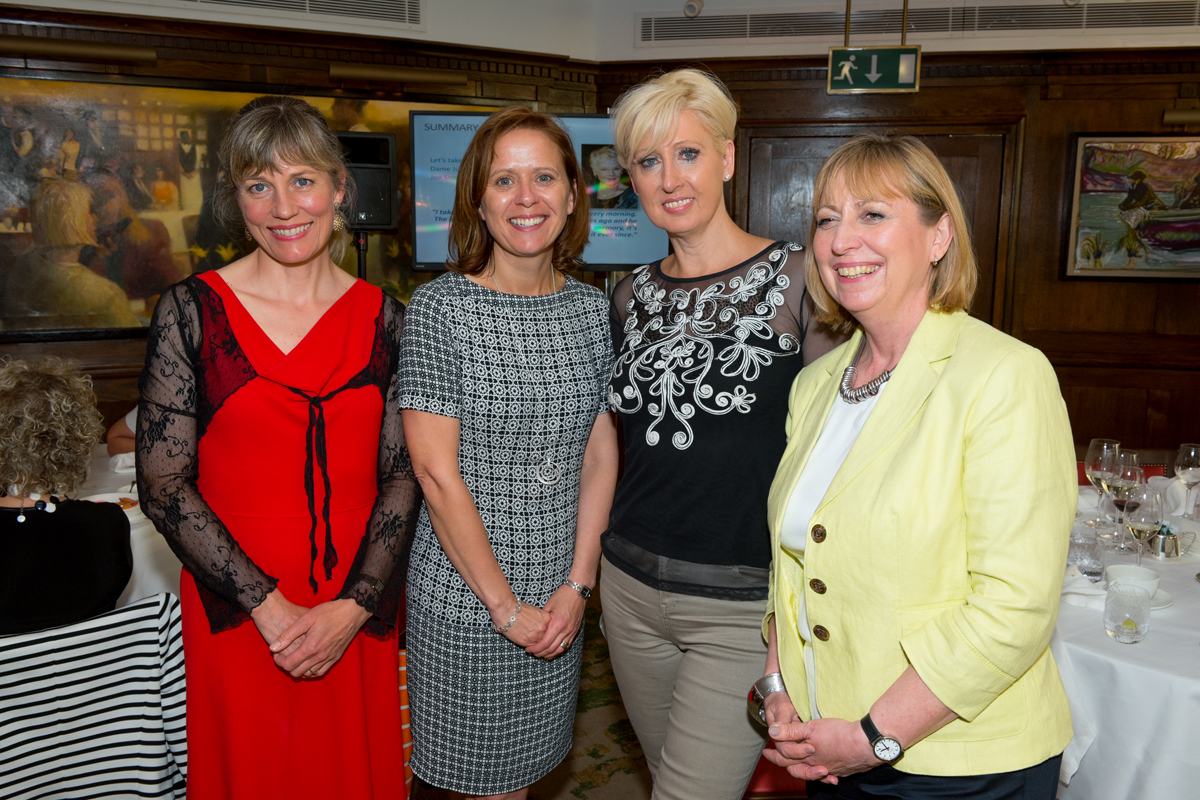On Thursday 11th June, The Ivy played host to a presentation by three leading experts who detailed new research and science concerning brain health from cradle to grave,
including the importance and benefits of omega fatty acids.
Professor Michael Crawford, a director of the Institute of Brain Chemistry and Human Nutrition gave a brief synopsis of what makes our brains ‘tick’, outlining latest brain health research including how omega fatty acids support optimal cognitive function. Thirty years ago, he predicted dangers if long-chain DHA and EPA omega-3 dietary intakes were not increased, a prediction in danger of coming true as rates of depression, schizophrenia, Alzheimer’s and other cognitive disorders spiral in the western world… he opened with a grave and eye-opening statement:
“We are facing the most serious crisis ever in terms of future sustainability of homosapiens… it has now been vindicated as brain disorders have overtaken all other burdens of ill health. In the UK, the cost was assessed at £77 billion for 2007. A recent update by the Department of Health came out at £105 billion. This cost is greater than heart disease and cancer combined.
Moreover, the greatest rise is amongst children…”
So… why the rhino?
It’s been a common misconception that fish and seafood provide the highest content of protein, that’s why we eat it… right? Wrong! Protein is readily obtainable and the cow, horse and rhinoceros all gain their optimum intake from grass. Human developmental biology is all about brain growth and the human brain is approximately 60% fat, but, In fact, human milk contains the least amount of protein compared to any other large mammal. There is abundant evidence in animals and humans on the need for DHA for the brain, but fish and sea foods are not necessarily of major value for protein but are for their essential fats and trace elements needed for good brain development and health.
The brain evolved in the sea 500-600 million years ago using marine fats and trace elements. It still uses the same today, so addressing this issue is the greatest challenge we face as humans. It’s commonly noted that a well-managed diet containing effective levels of omega-3 helps parents and professionals manage conditions like dyslexia, attention-deficit hyperactivity disorder (ADHD), dyspraxia and autism spectrum disorders.
Award winning dietitian Dr Carrie Ruxton examined omega intakes in the modern day diet and benefits of omega-3, whatever our age. She outlined that, in dietary terms, things began to go wrong when we made the shift from hunter-gatherer to farming, around 10,000 years ago. The fossil record shows that as our intake of omega-3 began to tail off, our brains began to shrink, with the average male brain dwindling from 1,500 cubic centimetres to 1,350 cubic centimetres.
Dr Ruxton went on to explain the ‘fabulous’ fats and ones which are less than fantastic for brain health and function.
Omega-3 is an umbrella term typically used to describe polyunsaturated fatty acids, such as DHA (Docosahexaenoic Acid), EPA (Eicosapentaenoic Acid) and ALA (alpha-linolenic Acid). DHA and EPA can be made in the body from ALA, but the process is slow and inefficient, so regular dietary consumption is vital to ensure we get enough.
EPA is found in oily fish and plays a key role in signalling between brain cells, both anti-inflammatory and neuroprotective. Studies have shown low blood levels in patients with depression, schizophrenia and Alzheimer’s.
DHA is another omega-3 marine oil which provides the building blocks of the brain, nervous system and eyes, it makes up 40% of the polyunsaturated fatty acids (PUFAs) in the brain and 60% of those found in the retina. A diet high in DHA is associated with improved learning ability, but a deficiency is linked to poor cognitive performance, Alzheimer’s disease, depression, aggression, stress and ADHD.
ALA is a vegetarian source of omega-3 which is most commonly found in flaxseeds. Our body converts it into EPA, which in turn is converted into DHA.
Omega-6 includes 11 polyunsaturated fatty acids which are found in nuts, seeds, vegetable oils and animal fats.
The long and the short of it… it’s all about getting the balance right!
But why are we so out of balance?
When we examine the diet up to the Victorian era, the ratio of omega-6 to omega-3 was 1:1, but an upsurge in intensive production of land-based foods since World War II is exacerbating the decline in DHA intakes which began 10,000 years ago when Paleolithic hunter-gatherers starting farming. Now, our diet is so wildly out of step with our evolutionary age, this ratio could be as high as 50:1! And it cannot be ignored that it’s no accident that this shift has coincided with a surge in cognitive conditions across the ages.
During World War II, oily fish, such as herrings, were off-ration and housewives became creative in their recipes, incorporating this oily fish into the household’s diet at least once a week. Taking a leaf out of granny’s book and bringing this nutritious food back into our day-to-day menu may take the brakes off the detrimental effects of some of the processes triggered in the brain by high-fat diets.
When questioned, the average respondent will cite tinned tuna as an oily fish, commonly teamed up with pasta for what is considered a meal high in omega-3, but in fact, tinned tuna is LOW in omega-3, due to being canned in brine or vegetable oil!
Another myth is that pregnant and breastfeeding women should avoid all oily fish, but in order to ensure adequate levels of omega-3, expectant mothers should be eating at least one portion a week. It’s quite staggering that one UK study of 9,000 families found women with the lowest consumption of omega-3 from oily fish had children with lower IQs by the age of three. By the time they were teens, they were twice as likely to struggle with social interactions and have trouble making friends – ‘These children may be on a developmental trajectory towards life-long disruptive and poorly-socialised behaviour as they grow up” Dr Joseph Hibbeln.
Parenting coach Lorraine Thomas provided expert advice on behaviour management in children and teenagers.
Quite reassuringly, Lorraine opened her presentation by informing the invited guests that “…tantrums indicate you and your child are developing normally, but understanding what causes them helps you manage them well.”
She outlined that working mums spend between 1 and 2 hours a day worrying, 9 out of 10 parents throw tantrums on a regular basis and 8 out of 10 act their children’s age at least once a week!
With the key trigger times being the evening routine and sleep, mealtimes and homework, Lorraine commented that, as a parent, we are our child’s most powerful role model and when you look after yourself, you are looking after your children – you are the family ‘engine room’ and great habits are caught not taught. The greatest impacts on a child’s behaviour and attitude are following a healthy diet, exercise, sleep, fun and love.
Frantic parents have frantic children and well-balanced parents have well-balanced children, so it’s important to develop good routines and a healthy attitude.
Lorraine’s key pieces of advice:
* set your parent ‘Tom-Tom’ and create a schedule, involve your child in some of the choices
* you can’t be 100% parent all of the time, but you can some of the time
* engage all your senses and ‘tune in’ to what makes them behave in a challenging way
* eat with them whenever you can
* every day is an opportunity to make a difference in our children’s lives
Equazen has spent many years of scientific investment to develop and create the Equazen range as we know it today, a unique formulation of both omega-3 and omega-6, meeting the specific needs of different life stages.
Equazen Mumomega is ideal for during and after pregnancy, The specific blend of omega-3 EPA and DHA, together with omega-6 GLA ensures a synergistic and balance formulation to meet baby’s individual needs.
Equazen Baby provides a balanced blend of omega-3 and omega-6 to support growth and development for babies from 6 months to 3 years.
Equazen Liquid is ideal for children 3 years+ and adults who don’t like swallowing pills and capsules – available in two flavours – vanilla and citrus.
Equazen Chews deliver a specific blend of omega-3 and omega-6 oils in a soft gelatin chew in a strawberry flavour, free from additives such as aspartame, saccharine or hydrogenated oils.
Equazen Capsules offer a combination of omega-3 EPA and DHA together with omega-6 GLA, ensuring a balance formulation to support the body’s individual needs.
Equazen Mind 50+ is a balanced formulation, great for those who find it hard to eat oily fish.
Available from: Boots, Ocado, Holland & Barrett, Tesco, Waitrose, Sainsbury’s, Lloyds Pharmacy, Amazon, independent pharmacies and healthfood stores.
Guests enjoyed a delightful menu consisting of:
Argyll smoked salmon with soda bread and a slice of lemon, roast rump of Cornish lamb, new potatoes and spinach, gooseberry pie with elderflower ice cream and a selection of teas, coffee and petits fours with Framingham Sauvignon Blanc, Marlborough 2014 New Zealand and Château La Grave Singalier Bordeaux Supérieur 2012 France
L to R: Dr Carrie Ruxton, Anita Clarke (Equazen), Corinne Tuddenham-Trett and Lorraine Thomas
Professor Michael Crawford…
Professor Crawford has been the Director of the Institute of Brain Chemistry and Human Nutrition since 1990. Having worked in the East-end of London on maternal nutrition and health with Newham, the Homerton and Queen Elizabeth Hospital for Children, he is now at Reproductive Physiology at the Chelsea and Westminster Hospital Campus of Imperial College, London. His special interest is in the role that lipids and essential fatty acids play interacting with the cellular signalling systems, i.e. the key interaction between nutrition affecting membrane lipids and gene expression.
He has published over 300 peer reviewed papers and 3 books. Amongst his several honours and prizes, he was elected by his peers to the Hall of Fame at the Royal Society of Medicine in 2010. In 2015 he was awarded the Chevreul Medal for his research on DHA identification as a major determinant of brain growth and plausible evolution of the human brain. He collaborates in research internationally and is much in demand as a lecturer worldwide.
In 1972, Professor Crawford published ‘What We Eat Today’ – available from http://www.amazon.com/What-eat-today-Michael-Crawford/dp/0854353607
– See more at: http://www.ifbb.org.uk/professor-michael-crawford#sthash.F9u1oYRZ.dpuf
Dr Carrie Ruxton…
With a PhD in Child Nutrition and over 100 published articles on diet and health, Carrie has a strong grounding in nutrition science. Yet she combines this with an understanding of the food industry and its important role in the nation’s diet. As well as helping companies to develop healthy, innovative food and beverage products, Carrie regularly appears in magazines and newspapers, and has a number of radio and TV credits (Channel Four news, BBC Three’s ‘Honey We’re Killing the Kids’, Radio Scotland, Five Live, BBC Belfast). Carrie has worked with a wide range of organisations including the NHS , Food Standards Agency, major food companies, ingredient manufacturers, the European Commission, PR agencies and national newspapers. Carrie’s expertise in communicating clear, evidence-based nutrition and diet messages has involved her in many different projects all over the world.
http://www.nutrition-communications.co.uk/
Lorraine Thomas…
Lorraine Thomas is the Chief Executive of The Parent Coaching Academy. She is the author of The 7-Day Parent Coach (Vermilion 2005), Get A Life (Hodder Arnold 2006) and her new book, The Mummy Coach (Hamlyn), published in 2010. She is the parent coach for Tesco’s baby & toddler club and healthy living magazine. www.tesco.com/babyclub/
She appears regularly in the national media commenting on parenting issues. Lorraine has over 20 years’ experience working with executives within the corporate, public and voluntary sectors. She has a first-class honours degree in education from Cambridge University and is a qualified teacher. She is accredited with distinction by The Coaching Academy.
http://www.theparentcoachingacademy.com/
The Ivy…
The Ivy restaurant and private room re-opened on Monday, 1 June, designed by Martin Brudnizki Design Studio. “Non-negotiables” such as the harlequin stained glass windows, green leather banquettes, wood, mirrors, great art and kind lighting are all incorporated in a way reminiscent of the past but apt for the 21st century. Note-worthy are the fantastic central dining bar, the new entrance and the sumptuous loos. Chef Gary Lee has created a balanced seasonal menu, still featuring Ivy classics, but accounting for today’s tastes, incorporating more Asian dishes, salads and vegetables, and the advent of a “sea and shells” section. Director Fernando Peire continues to lead a strong and experienced team to deliver the same excellent service for which The Ivy has become well known over the years.
Images copyright Shane Finn www.visual-devotion.co.uk


![World-Rhino-Day-2011-low-res[1]](https://www.frostmagazine.com/wp-content/uploads/2015/06/World-Rhino-Day-2011-low-res1.jpg)



![oilyfish[1]](https://www.frostmagazine.com/wp-content/uploads/2015/06/oilyfish1.jpg)





It says that the professor predicted that humanity was in danger of becoming a “race of morons” and that the prediction was in danger of coming true with the spiral (increase?) of depression, schizophrenia etc. It really does come across as labelling morons and neurological disorders as one and the same. I really don’t know any other way of interpreting it so would genuinely appreciate you explaining what meaning you’ve taken from that particular part of the article.
Frost magazine has writers who have neurological disorders and I find your insinuation offensive. Not to mention it is libel.
Ben, the Professor did not say that at all. Please re-read the article. Thank you.
I agree corinne did not but the professor did. And you published it.
We would never use words like that. I advise you to read the article again instead of spreading offensive libel. Shame on YOU for lying.
please remove this article it is disgusting labelling people with neurological disorders as “a race of morons” Shame on you.